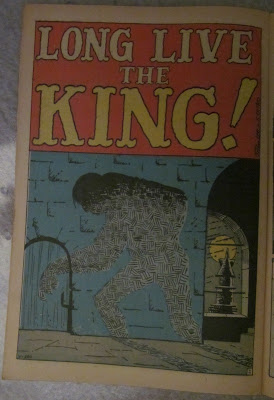by
James Robert Smith
Perry placed her hands atop the manuscripts. Upon her desk, four pillars of envelopes: 8 1/2 inches by 11 inches on a side, twelve inches high. She edited APPALLING, The Magazine of Horror; and she had finished the latest issue and had to return these 200 stories: rejections. There were some authors she had counted upon to deliver the effect she always aimed for, but who had not made the cut, this time.
This was the effect for which she was searching. Editing was an art form, but she'd never crossed the line that would satisfy. Critics praised her. It was only that she, Perry Hagopian, had never been satisfied.
She'd done it: a wonderful, terrible achievement.
She had the combination of fiction for which she had always searched. She had eliminated her editorial and all advertising. That had meant the budget would be strained, but she had made the printer's bill. She had what she wanted: the perfect issue.
Perry had a story from Cain Warner, the contract in her desk. It had been one of the last things he had signed for he'd died the day after it had been posted--alcoholism, they said. Perry heard the news before the contract arrived. He was one of her favorites, but she had held the contract to her and breathed a sigh. His novella was the core, the anchor.
There were three posthumous stories. One arrived from the author's mother, a letter informing Perry that the writer (a youngster named Cynthia Packard) had committed suicide the year before. Cynthia's mother had found the manuscript in an envelope addressed to APPALLING. I want you to see this story, her mother had written. I couldn't understand my daughter, but she wanted you to publish this. Perhaps you will like it. Indeed. A story of enormous anguish, and she was thrilled with it. This would put Packard's sad name on the genre's map.
She had a story by the late Manuel Manfred. His agent had contacted her saying that he had located an unpublished story from Manfred and that he thought her magazine would be the place for it. It was.
The remaining were by three regulars. She knew them all. William took his pain and squeezed it through his pen: a dyslexic, he couldn't use a keyboard. With effort, he wrote his stories a letter at a time, in block print, checking each word. His manuscripts broke all rules, but his first cover letter had touched her so that she had read the story. All of his stories had been wonderful, and this one was the best.
Conrad lived nearby. He was a sad man, engaged in a painful relationship with an abusive lover. Once, she had seen him with his eye blackened and his lip swollen. A man such as Conrad could have his pick of lovers, and she couldn't understand why he would put up with the one he had. But it must have made his fiction powerful. Her pulse raced every time she read one of his stories. Poor Conrad.
Finally, Terrance. He wrote television; such a waste. But who could refuse that money? Perry had met him two years before. The writer of popular shows, she was surprised when he had approached her. "I have some stories," he said. "They aren't appropriate for many markets, and I was wondering if I could send them to you." How wasted he was on television. "I hardly have time for my own writing", he'd said.
The stories filled the magazine. All expressed operatic pain. She had saved herself the back cover: At last, it read, and her autograph. She had paid the printers, the magazines were on their ways to distributors and shops and subscribers. On her lap was a copy, the cover glistening, reflecting a light she could only think of as evil.
Outside, Perry's husband was banging on the bolted door. It would take him a long time to break in. He had noticed his gun missing. She didn't want to go out that way, but realizing she'd finally done it--well, it was time. To jigsaw such a work of consuming depression: this was her masterpiece. And the final act was to tag her death. How could anyone read those works and refuse what they demanded?
The struggle was over. Still, she was curious how many deaths would be spawned by the readings. The poor miserables, once they realized, would have no choice.
Perry examined the chamber. Time to finish editing.
Bang

















































